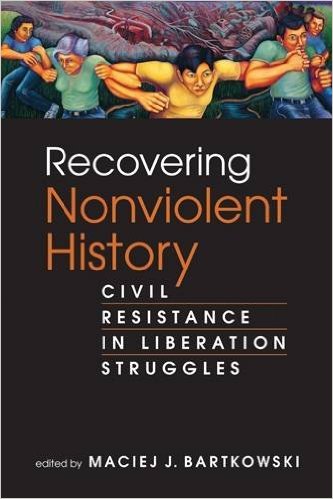Review of my edited book Recovering Nonviolent History: Civil Resistance in Liberation Struggles by Erica Chenoweth in Journal of Peace Research, November 2013, vol. 50, 761.
Bartkowski, Maciej, ed. (2013) Recovering Nonviolent History: Civil Resistance in Liberation Struggles. Boulder, CO: Lynne Rienner. xii + 436 pp. ISBN 9781588268952.
Political science and sociology have long regarded n ation-building as a fundamentally violent process. As Charles Tilly famously argued, ‘War makes the state, and the state makes war.’ This volume challenges this claim, arguing instead that popular nonviolent struggles have been equally influential in defining peoples, cultures, and borders. In Recovering Nonviolent History, Maciej Bartkowski has assembled a compelling set of research articles that describe the many ways that people power movements have actively confronted foreign occupation, colonial influence, and territorial domination in ways that have affected the current global landscape. Impressive in global and historical scope, the book’s main theoretical contribution is its conjecture that nonviolent resistance may have played an equally important role in the establishment of nations and states as violent struggle – a hypothesis that receives limited support in the case studies, though systematic testing is left to future researchers. Each of the chapters possesses originality, detailed research, and success at ‘recovering’ some novel national histories. Highlights include Conser’s chapter on civil resistance in the American colonies from 1765 to 1775, and Smithey’s chapter, which challenges the notion that collective action is always predetermined by pre-existing repertoires and argues that instead, opportunities and opponent moves can produce novel forms of collective action that can in turn reinforce existing values or even introduce new identities. The main weakness of the volume is the puzzle that remains – if nonviolent struggles have been so important in state and identity formation, then why have they been forgotten? Bartkowski’s concluding chapter offers some potential explanations – including the ‘cloaking’ of masculinity in the archetype of armed struggle, the influence of external actors taking credit for victorious struggles, and that civil resistance is just now an emerging field of study – but the volume leaves these as untested hypotheses. More research is required to understand the reasons why the history of nonviolent resistance needs recovering in the first place.
ation-building as a fundamentally violent process. As Charles Tilly famously argued, ‘War makes the state, and the state makes war.’ This volume challenges this claim, arguing instead that popular nonviolent struggles have been equally influential in defining peoples, cultures, and borders. In Recovering Nonviolent History, Maciej Bartkowski has assembled a compelling set of research articles that describe the many ways that people power movements have actively confronted foreign occupation, colonial influence, and territorial domination in ways that have affected the current global landscape. Impressive in global and historical scope, the book’s main theoretical contribution is its conjecture that nonviolent resistance may have played an equally important role in the establishment of nations and states as violent struggle – a hypothesis that receives limited support in the case studies, though systematic testing is left to future researchers. Each of the chapters possesses originality, detailed research, and success at ‘recovering’ some novel national histories. Highlights include Conser’s chapter on civil resistance in the American colonies from 1765 to 1775, and Smithey’s chapter, which challenges the notion that collective action is always predetermined by pre-existing repertoires and argues that instead, opportunities and opponent moves can produce novel forms of collective action that can in turn reinforce existing values or even introduce new identities. The main weakness of the volume is the puzzle that remains – if nonviolent struggles have been so important in state and identity formation, then why have they been forgotten? Bartkowski’s concluding chapter offers some potential explanations – including the ‘cloaking’ of masculinity in the archetype of armed struggle, the influence of external actors taking credit for victorious struggles, and that civil resistance is just now an emerging field of study – but the volume leaves these as untested hypotheses. More research is required to understand the reasons why the history of nonviolent resistance needs recovering in the first place.
Erica Chenoweth




Leave a Reply